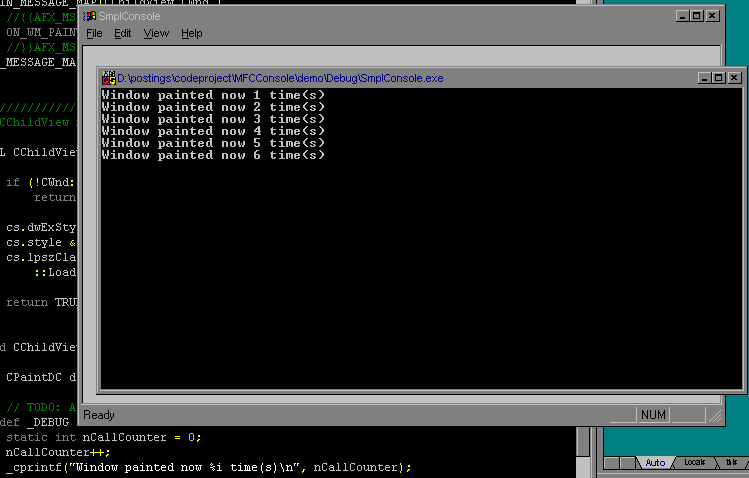댓글 쓰기 권한이 없습니다. 로그인 하시겠습니까?
|
MFC
2009.09.01 14:48
MFC app 디버깅 출력을 위한 콘솔 생성하기
조회 수 42993 댓글 0
출처 : http://www.codeproject.com/KB/debug/mfcconsole.aspx
It's simply a matter of three function calls to print a message to a console in your MFC application. There are several reasons why you might want to send your debugging output to a console. Mine were, that 1st, I didn't have an IDE on the PC where I tested the debug-builds of my app and 2nd, the Mainframe was not always visible, which made matters worse. A last word of warning beforehand: Closing the console window will exit your application! Let's go: Creating the consoleTo create a console window you need to call BOOL CSmplConsoleApp::InitInstance()
{
// details omitted
// allocate a console
#ifdef _DEBUG
if (!AllocConsole())
AfxMessageBox("Failed to create the console!", MB_ICONEXCLAMATION);
#endif
return TRUE;
// and then create the frame
pFrame->LoadFrame(IDR_MAINFRAME,
WS_OVERLAPPEDWINDOW | FWS_ADDTOTITLE, NULL,
NULL);
// The one and only window has been initialized, so show and update it.
pFrame->ShowWindow(SW_SHOW);
pFrame->UpdateWindow();
}
It is important that you create your console before you create the main window. If you don't, the console will still be created, but your debugging messages send with Writing to the consoleSend your output to the console via int _cprintf( const char *format [, argument] ... ); The format has the same form and function as the format parameter for the The void CChildView::OnPaint() { CPaintDC dc(this); // device context for painting // TODO: Add your message handler code here #ifdef _DEBUG static int nCallCounter = 0; nCallCounter++; _cprintf("Window painted now %i time(s)\n", nCallCounter); #endif // Do not call CWnd::OnPaint() for painting messages } Getting rid of the consoleSomewhere near the end of your program you should call int CSmplConsoleApp::ExitInstance() { // deallocate console #ifdef _DEBUG if (!FreeConsole()) AfxMessageBox("Could not free the console!"); #endif return CWinApp::ExitInstance(); } Hope that helps! Dreamy의 코드 스크랩내가 모으고 내가 보는
| ||||||||||||||||||||||||||||||||||||||||||||||||||||||||||||||||||||||||||||||||||||||||||||||||
